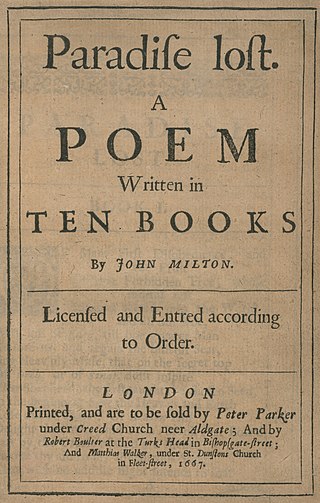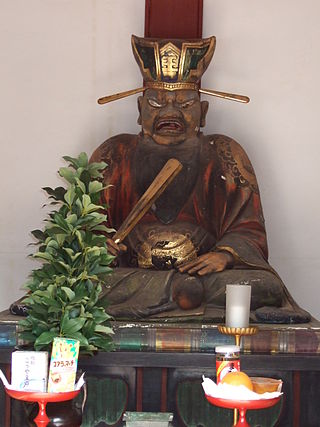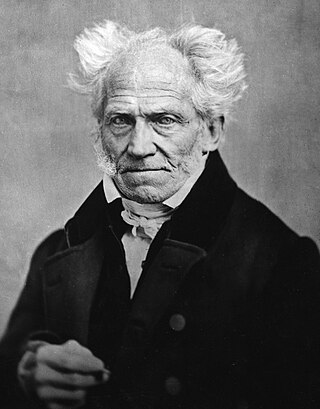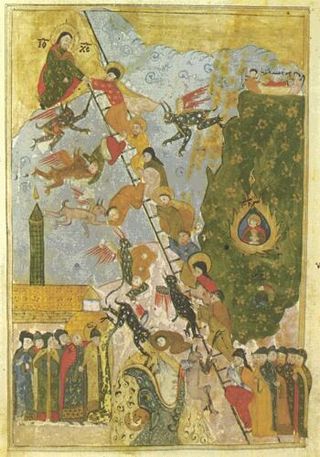| God Is Greater than Man | ||||
|---|---|---|---|---|
 | ||||
| Studio album by | ||||
| Released | April 17, 2007 | |||
| Genre | Reggae | |||
| Label | Cousins | |||
| Luciano chronology | ||||
| ||||
God Is Greater than Man is Jamaican reggae singer Luciano's 13th album.
| God Is Greater than Man | ||||
|---|---|---|---|---|
 | ||||
| Studio album by | ||||
| Released | April 17, 2007 | |||
| Genre | Reggae | |||
| Label | Cousins | |||
| Luciano chronology | ||||
| ||||
God Is Greater than Man is Jamaican reggae singer Luciano's 13th album.
The problem of evil is the question of how to reconcile the existence of evil and suffering with an omnipotent, omnibenevolent, and omniscient God. There are currently differing definitions of these concepts. The best known presentation of the problem is attributed to the Greek philosopher Epicurus. It was popularized by David Hume.

Paradise Lost is an epic poem in blank verse by the 17th-century English poet John Milton (1608–1674). The first version, published in 1667, consists of ten books with over ten thousand lines of verse. A second edition followed in 1674, arranged into twelve books with minor revisions throughout. It is considered to be Milton's masterpiece, and it helped solidify his reputation as one of the greatest English poets of all time. The poem concerns the biblical story of the fall of man: the temptation of Adam and Eve by the fallen angel Satan and their expulsion from the Garden of Eden.

Luck is the phenomenon and belief that defines the experience of improbable events, especially improbably positive or negative ones. The naturalistic interpretation is that positive and negative events may happen at any time, both due to random and non-random natural and artificial processes, and that even improbable events can happen by random chance. In this view, the epithet "lucky" or "unlucky" is a descriptive label that refers to an event's positivity, negativity, or improbability.

On the City of God Against the Pagans, often called The City of God, is a book of Christian philosophy written in Latin by Augustine of Hippo in the early 5th century AD. The book was in response to allegations that Christianity brought about the decline of Rome and is considered one of Augustine's most important works, standing alongside The Confessions, The Enchiridion, On Christian Doctrine, and On the Trinity. As a work of one of the most influential Church Fathers, The City of God is a cornerstone of Western thought, expounding on many questions of theology, such as the suffering of the righteous, the existence of evil, the conflict between free will and divine omniscience, and the doctrine of original sin.

Shinigami are kami that invite humans toward death in certain aspects of Japanese religion and culture. Shinigami have been described as monsters, helpers, and creatures of darkness. Shinigami are used for tales and religions in Japanese culture.

Dayenu is a song that is part of the Jewish holiday of Passover. The word "dayenu" means approximately "it would have been enough", "it would have been sufficient", or "it would have sufficed". This traditional up-beat Passover song is over one thousand years old. The earliest full text of the song occurs in the first medieval haggadah, which is part of the ninth-century Seder Rav Amram. The song is about being grateful to God for all of the gifts given to the Jewish people, such as taking them out of slavery, giving them the Torah and Shabbat, and had God only given one of the gifts, it would have still been enough. This is to show much greater appreciation for all of them as a whole. The song appears in the haggadah after the telling of the story of the exodus and just before the explanation of Passover, matzah, and the maror.
Gaunilo or Gaunillon was a Benedictine monk of Marmoutier Abbey in Tours, France. He is best known for his contemporary criticism of the ontological argument for the existence of God which appeared in St Anselm's Proslogion. In his work In Behalf of the Fool, Gaunilo contends that St Anselm's ontological argument fails because logic of the same kind would force one to conclude many things exist which certainly do not. An empiricist, Gaunilo thought that the human intellect is only able to comprehend information provided by the senses.
The Kuku are a tribe of the Karo people from South Sudan. They inhabit the agricultural lands of Kajo Keji County in Central Equatoria State. The Kuku speak a Kuku dialect, also called BaKuku.
Veritatis splendor is an encyclical by Pope John Paul II. It expresses the position of the Catholic Church regarding fundamentals of the Church's role in moral teaching. The encyclical is one of the most comprehensive and philosophical teachings of moral theology in the Catholic tradition. It was promulgated on 6 August 1993. Cardinal Georges Cottier was influential in drafting the encyclical, as was Servais-Théodore Pinckaers, a professor of moral theology at the University of Fribourg.

Tazkiyah is an Arabic-Islamic term alluding to tazkiyat al-nafs, meaning 'sanctification' or 'purification of the self'. This refers to the process of transforming the nafs from its state of self-centrality through various spiritual stages towards the level of purity and submission to the will of God. Its basis is in learning the shariah and deeds from the known authentic sunnah and applying these to one's own life, resulting in spiritual awareness of God. Tazkiyah is considered the highest level of ihsan, one of the three dimensions of Islam. The person who purifies themself is called a zaki.
Laborem exercens is an encyclical written by Pope John Paul II in 1981, on human work. It is part of the larger body of Catholic social teaching, which traces its origin to Pope Leo XIII's 1891 encyclical Rerum novarum.
Although rare, there are instances within Jewish law that mandate a Jew to sacrifice their own life rather than violate a religious prohibition. One of these prohibitions is that no life should be taken, including one's own. Many more ritual prohibitions exist as well, which means that under limited circumstances a Jew has to self-sacrifice when the greater good calls for breaking a more minor dictate. This practice reflects the practical and perhaps malleable nature of Judaic law.
"What Men Live By" is a short story written by Russian author Leo Tolstoy in 1885. It is one of the short stories included in his collection What Men Live By, and Other Tales, published in 1885. The compilation also included the written pieces "The Three Questions", "The Coffee-House of Surat", and "How Much Land Does a Man Need?".
The spirit world, according to spiritualism, is the world or realm inhabited by spirits, both good or evil of various spiritual manifestations. This spirit world is regarded as an external environment for spirits. The Spiritualism religious movement in the nineteenth century espoused a belief in an afterlife where individual's awareness persists beyond death. Although independent from one another, both the spirit world and the physical world are in constant interaction. Through séances, trances, and other forms of mediumship these worlds can consciously communicate with each other.

Antinatalism or anti-natalism is a family of philosophical views that are critical of reproduction — they consider coming into existence as bad or deem procreation as immoral. Antinatalists thus argue that humans should abstain from having children. Antinatalist views are not necessarily limited only to humans, but may encompass all sentient creatures, claiming that coming into existence is a harm for sentient beings in general.

Dead Gods is an adventure module for the second edition of the Advanced Dungeons & Dragons fantasy role-playing game.
An ontological argument is a philosophical argument, made from an ontological basis, that is advanced in support of the existence of God. Such arguments tend to refer to the state of being or existing. More specifically, ontological arguments are commonly conceived a priori in regard to the organization of the universe, whereby, if such organizational structure is true, God must exist.

Greed is an insatiable desire for material gain or social value, such as status, or power. Greed has been identified as undesirable throughout known human history because it creates behavior-conflict between personal and social goals.

John 1:51 is the 51st verse in the first chapter of the Gospel of John in the New Testament.